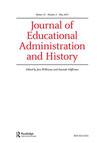Introduction to rapid response papers’ special issue: school leadership and the pandemic
IF 1.8
Q2 EDUCATION & EDUCATIONAL RESEARCH
Journal of Educational Administration and History
Pub Date : 2021-10-02
DOI:10.1080/00220620.2021.1981018
引用次数: 0
Abstract
We are delighted to introduce the first in our occasional series of rapid response papers on the highly topical issue of school leadership and the Covid 19 pandemic. We warmly thank the contributors of these papers for being willing to provide this ‘taster’ for readers and potential contributors of what we envisage for these collections. As noted in our editorial to this issue, the aim of this series to ‘to rapidly engage with highly topical issues that are in the public arena and may have substantial impacts on policy and practice in the field of educational leadership, management, and administration’ (Heffernan and Wilkinson, this issue). As editors, we felt that the impact of Covid 19 on school leaders across contexts was indeed a highly topical issue with substantial impacts and necessitated a rapid response. The first paper by Pat Thomson, Toby Greany and Nicholas Martindale speaks to many of the impacts on wellbeing that school leaders are experiencing as they bear the brunt of government initiatives to deal with the pandemic while keeping schools functioning. Drawing on a national survey of school leaders which examined the impact of the pandemic on their stress levels and career plans, the paper makes for sobering reading. It documents the main sources of stress that have led to a significant erosion of trust in government and intentions of a third of school leaders surveyed to exit the profession early (Thomson et al. 2021, this issue). If these intentions are followed through, the medium to long-term implications for English schooling are dire. The paper concludes with important recommendations for how this trust deficit can be addressed. The second paper by Ben Arnold and Mark Rahimi examines the impact of the pandemic on Australian principals’ health, well being and work roles in 2020. The survey data draws from the Australian Principal Health, Safety and Wellbeing Survey (APHSWS), an annual survey of principals which has been running for ten years. The paper identifies which aspects of school leaders’ work have changed in 2020, compared with survey data from 2011 to 2019. It finds that key aspects of their work had changed a great deal in 2020, included job demands, interpersonal relations and role, values at work and social support and work-life balance. What was striking was that some key aspects such as workloads had slightly decreased, admittedly off a very high base of working hours, whilst other areas such as workplace justice had deteriorated. The implications of these findings remain to be teased out further, but they provide an important snapshot of the very challenging environments in which Australian principals continue to grapple. Both papers draw on survey data which provides a compelling picture of general trends of the impact on school leaders during the pandemic. However, as Thomson, Greany and Martindale observe in their first paper, what is less clear are the impacts of Covid on leaders serving particular types of schools, such as highly vulnerable populations, small and rural schools etcetera. We look forward to more insights from other contributors who快速反应论文特刊简介:学校领导与大流行
我们很高兴介绍我们关于学校领导和Covid - 19大流行这一高度热门问题的快速反应系列论文中的第一篇。我们衷心感谢这些论文的贡献者愿意为读者和潜在的贡献者提供这个“品尝器”,我们为这些集合设想了什么。正如我们在本期社论中所指出的那样,本系列的目的是“迅速参与到公共领域中高度热门的问题中,这些问题可能对教育领导、管理和行政领域的政策和实践产生重大影响”(Heffernan和Wilkinson,本期)。作为编辑,我们认为2019冠状病毒病对学校领导的影响确实是一个高度热门的问题,具有重大影响,需要迅速做出反应。帕特·汤姆森(Pat Thomson)、托比·格雷尼(Toby Greany)和尼古拉斯·马丁代尔(Nicholas Martindale)撰写的第一篇论文谈到了学校领导正在经历的许多对福祉的影响,因为他们在保持学校运转的同时,承受着政府应对疫情举措的冲击。根据一项针对学校领导的全国性调查,该调查研究了疫情对他们的压力水平和职业规划的影响,这篇论文读起来发人深省。它记录了压力的主要来源,导致对政府的信任受到严重侵蚀,三分之一的受访学校领导有意提前退出该行业(Thomson et al. 2021,本期)。如果这些意图得以实现,对英语教育的中长期影响将是可怕的。论文最后就如何解决这一信任赤字提出了重要建议。本·阿诺德和马克·拉希米的第二篇论文研究了2020年新冠肺炎疫情对澳大利亚校长健康、福祉和工作角色的影响。调查数据来自澳大利亚校长健康、安全和福利调查(APHSWS),这是一项针对校长的年度调查,已经进行了十年。与2011年至2019年的调查数据相比,该论文确定了2020年学校领导工作的哪些方面发生了变化。调查发现,在2020年,他们工作的关键方面发生了很大变化,包括工作需求、人际关系和角色、工作价值观、社会支持以及工作与生活的平衡。令人惊讶的是,一些关键方面,如工作量略有下降,诚然,这是在一个非常高的工作时间基础上,而其他方面,如工作场所的公平性,则有所恶化。这些发现的含义仍有待进一步梳理,但它们为澳大利亚校长继续努力应对的非常具有挑战性的环境提供了重要的快照。这两篇论文都利用了调查数据,提供了一幅令人信服的大流行期间对学校领导影响的总体趋势的图景。然而,正如Thomson、Greany和Martindale在他们的第一篇论文中所观察到的那样,不太清楚的是,新冠病毒对服务于特定类型学校(如高度弱势群体、小型和农村学校等)的领导者的影响。我们期待来自其他贡献者的更多见解
本文章由计算机程序翻译,如有差异,请以英文原文为准。
求助全文
约1分钟内获得全文
求助全文
来源期刊

Journal of Educational Administration and History
EDUCATION & EDUCATIONAL RESEARCH-
CiteScore
3.80
自引率
5.60%
发文量
25
 求助内容:
求助内容: 应助结果提醒方式:
应助结果提醒方式:


